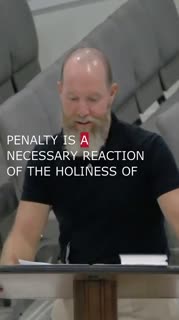In our exploration of the concept of penalty, we delve into its nature, implications, and the divine justice it represents. Penalty is a necessary response of God's holiness against sin, a reflection of His perfect justice. Unlike human justice, which can be flawed, God's justice is impeccable and always deserved. Sin, by its very nature, is deserving of punishment, and God never punishes the innocent. The penalty is not merely a consequence of breaking the law but a personal reaction of God against sin, embodying His holy wrath. This divine response is not vindictive but vindicative, upholding the character of God and His holiness.
Natural consequences of sin are part of its penalty, manifesting in physical, mental, and spiritual deterioration. These consequences are self-detecting and self-tormenting, revealing the destructive nature of sin. However, they are only a part of the penalty. The greater part is the personal reaction of God, which is far more significant. Spiritual death, the separation of the soul from God, is the chief penalty of sin, more severe than physical death. It is the absence of God's presence and favor, leading to a life devoid of true peace and joy.
Penalty is neither reformative nor preventative; it is primarily about vindicating the character of the lawgiver, God. It is an expression of His eternal and unchangeable holiness. While physical death is a part of sin's penalty, spiritual death is its culmination, leading to eternal separation from God. However, through union with Christ, we can escape this eternal death. For believers, there is no condemnation, as Christ has paid the penalty for our sins. Death becomes a pathway to eternal life, where faith is transformed into sight, and we are united with God.
Key Takeaways
- 1. being. These consequences are self-detecting and self-tormenting, revealing the destructive nature of sin. They serve as a warning of the deeper spiritual penalty that sin incurs. [09:40]
3. The Personal Reaction of God: Beyond natural consequences, the greater penalty of sin is the personal reaction of God. This is not merely a consequence of law but a personal expression of God's holy wrath against sin. It underscores the seriousness of sin and the need for repentance.
4. Vindication of God's Character: Penalty is not about reforming or deterring sinners but about vindicating God's character. It is an expression of His eternal holiness and justice. This understanding calls us to revere God's holiness and seek His grace.
5. Spiritual Death and Eternal Life: Spiritual death, the separation of the soul from God, is the chief penalty of sin. However, through faith in Christ, we can escape this eternal death and find eternal life. This hope transforms our understanding of death and eternity, offering peace and assurance.
** [09:40]
Youtube Chapters
- [00:00] - Welcome
- [00:43] - The Necessity of Penalty
- [01:47] - God's Perfect Justice
- [02:35] - Human Justice vs. Divine Justice
- [03:57] - Israel's Guilt and Punishment
- [04:47] - The Rebellion Against God
- [08:14] - Natural Consequences of Sin
- [09:40] - Self-Detecting and Self-Tormenting Sin
- [10:33] - Real-Life Consequences
- [12:38] - God's Personal Reaction
- [15:34] - Falling into the Hands of God
- [16:14] - The Holy Wrath of God
- [17:10] - God's Feelings Towards Sin
- [19:34] - The Fearful Reality of Sin
- [21:13] - The Seriousness of Sin
- [23:26] - Vindication of God's Character
- [25:08] - God's Calm and Judicial Wrath
- [26:16] - God's Perfect Timing
- [28:21] - Upholding God's Holy Name
- [29:39] - Promoting Godliness Through Discipline
- [31:23] - Chastisement vs. Punishment
- [32:54] - No Condemnation for Believers
- [36:53] - Physical Death as Penalty
- [38:11] - The Reality of Physical Death
- [40:00] - Spiritual Death as Chief Penalty
- [41:13] - Separation from God
- [44:29] - Eternal Death and Union with Christ
- [46:03] - The Fear of God and Eternal Life




